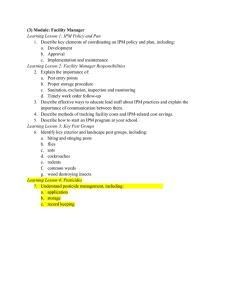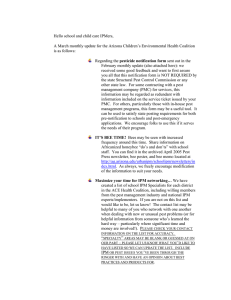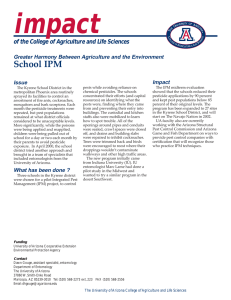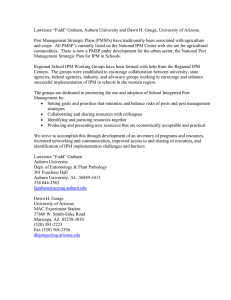Hello School IPMers and interested others,
advertisement
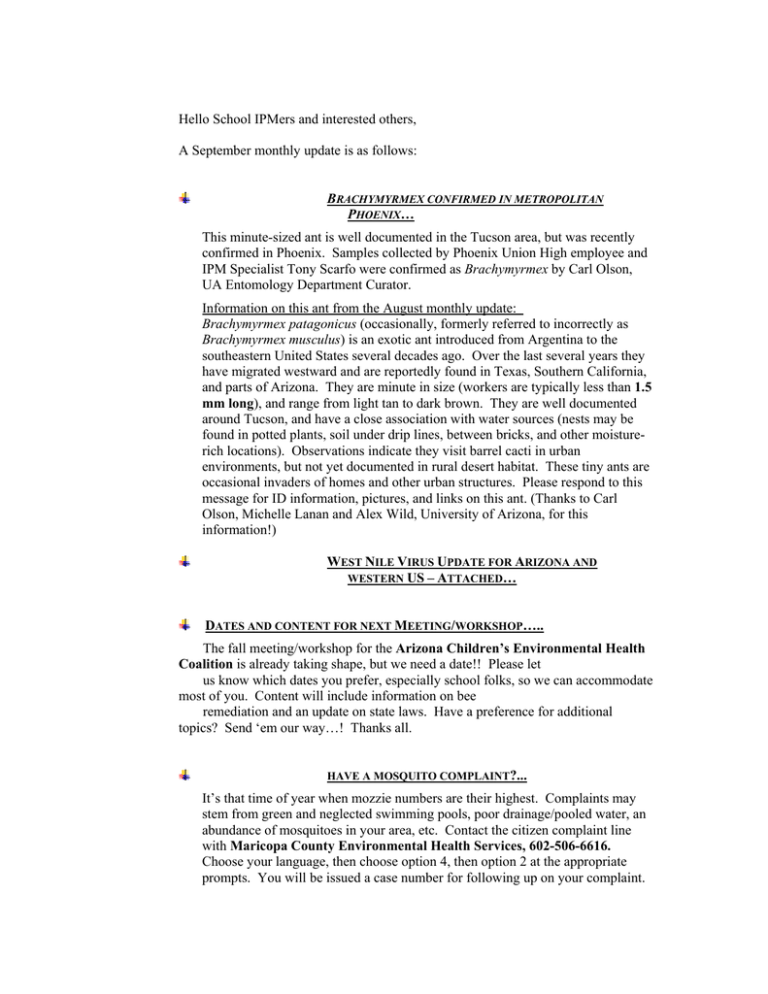
Hello School IPMers and interested others, A September monthly update is as follows: BRACHYMYRMEX CONFIRMED IN METROPOLITAN PHOENIX… This minute-sized ant is well documented in the Tucson area, but was recently confirmed in Phoenix. Samples collected by Phoenix Union High employee and IPM Specialist Tony Scarfo were confirmed as Brachymyrmex by Carl Olson, UA Entomology Department Curator. Information on this ant from the August monthly update: Brachymyrmex patagonicus (occasionally, formerly referred to incorrectly as Brachymyrmex musculus) is an exotic ant introduced from Argentina to the southeastern United States several decades ago. Over the last several years they have migrated westward and are reportedly found in Texas, Southern California, and parts of Arizona. They are minute in size (workers are typically less than 1.5 mm long), and range from light tan to dark brown. They are well documented around Tucson, and have a close association with water sources (nests may be found in potted plants, soil under drip lines, between bricks, and other moisturerich locations). Observations indicate they visit barrel cacti in urban environments, but not yet documented in rural desert habitat. These tiny ants are occasional invaders of homes and other urban structures. Please respond to this message for ID information, pictures, and links on this ant. (Thanks to Carl Olson, Michelle Lanan and Alex Wild, University of Arizona, for this information!) WEST NILE VIRUS UPDATE FOR ARIZONA AND WESTERN US – ATTACHED… DATES AND CONTENT FOR NEXT MEETING/WORKSHOP….. The fall meeting/workshop for the Arizona Children’s Environmental Health Coalition is already taking shape, but we need a date!! Please let us know which dates you prefer, especially school folks, so we can accommodate most of you. Content will include information on bee remediation and an update on state laws. Have a preference for additional topics? Send ‘em our way…! Thanks all. HAVE A MOSQUITO COMPLAINT?... It’s that time of year when mozzie numbers are their highest. Complaints may stem from green and neglected swimming pools, poor drainage/pooled water, an abundance of mosquitoes in your area, etc. Contact the citizen complaint line with Maricopa County Environmental Health Services, 602-506-6616. Choose your language, then choose option 4, then option 2 at the appropriate prompts. You will be issued a case number for following up on your complaint. OUTCOMES AND ACTIVITIES (2006-2007) Our fiscal year – which intersects the regular calendar year – is wrapping up, and we thought to share an update on some of our behind-the-scenes school IPM (sIPM) activities, both in-state and out of state. We coordinated with the Arizona Pest Management Center to engage a broad group of stakeholders at the 2006 Arizona Pest Management Center Summit (held at the Maricopa Agricultural Center June 2006). The goal was to identify school/community IPM priorities, which are now listed on the APMC website (http://cals.arizona.edu/apmc/Summit.html). Thanks to many of you who attended and provided your input. Based on the process of your input, we were able to secure funding from the Western IPM Center to support a western region working group focused on IPM in schools. The Western Region School IPM Implementation and Assessment Work Group. Established in 2006, this University of Arizona led group includes a diverse membership including universities, state agencies, federal agencies, pest management industry, and advocacy groups. The group collaborates to identify resources and pathways toward sustainable implementation of IPM in schools throughout the western United States. The level of interest and engagement in this work group has exceeded all of our expectations!! In less than one year, membership has grown from an initial 15 contacts from 7 states to currently 30 participants from 9 states (AZ, CA, CO, MT, NV, OR, UT, WA, WY). Many accomplishments have already emerged from our work which are already benefiting programs in the West and provide assistance to similar groups as ours operating in the Eastern US. We will meet in Portland, OR Sept 24-25 to discuss state programs and resources, visit a local school site practicing sIPM, and identify regional objectives and priorities for the coming year. Arizona’s school IPM program is increasingly restricted on available funding to support pilot programs and in-person implementation with school districts. We are continuing to participate in sIPM education projects nationwide, and will share new resources with you as they become available to the public. We will also continue to develop our own information resources and share information with you through these monthly updates, arthropod and IPM fact sheets, newsletters, meetings/workshops and the Urban IPM website. Your expertise as IPM practitioners continues to be a critical part of the Arizona Children’s Environmental Health Coalition… Thanks all!! Jennifer L. Snyder Research Specialist & School IPM Program Coordinator University of Arizona Maricopa Agricultural Center 37860 W. Smith-Enke Rd. Maricopa, AZ 85239 ph: 520.381.2266 fax: 520.568.2556 jsnyder@ag.arizona.edu http://ag.arizona.edu/urbanipm/
